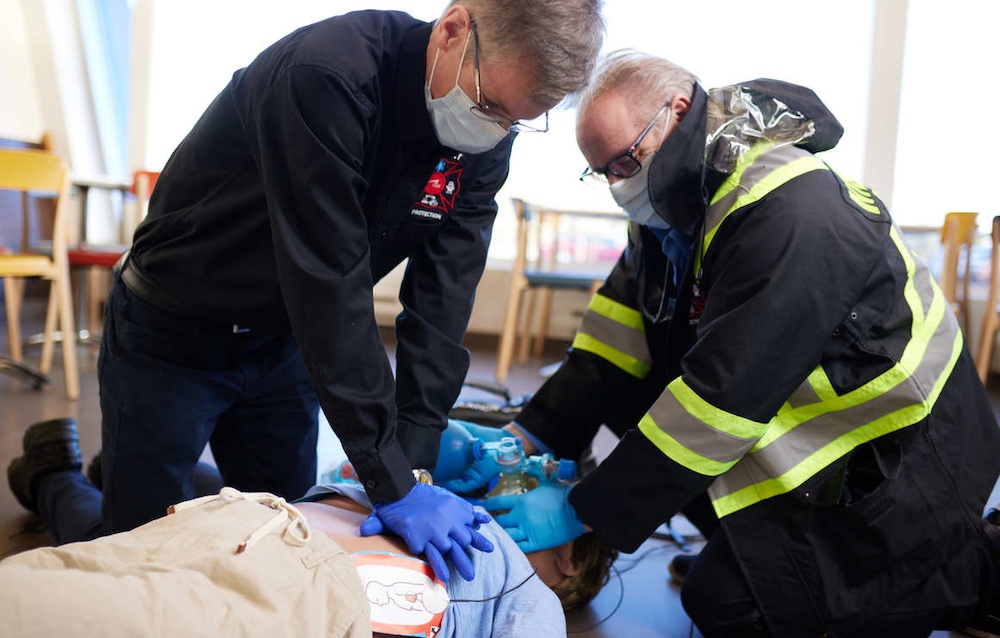CAE Healthcare is a leading vendor advancing simulation-based healthcare education for EMS providers. Clinical simulation is rapidly expanding in emergency-care and life-support training. Research demonstrates that appropriately developed simulation learning objectives and scenarios are as effective and, in many cases, more effective than traditional teaching methods. Evidence shows that simulation-based education is increasingly making a difference in emergency care. For example, the National Registry of Emergency Medical Technicians has required a scenario-based exam for paramedic certification since 2017. This HealthySimulation.com article explores how CAE Healthcare is meeting the need for simulation incorporation into the education and certification for EMTs.
Even so, efforts must continue to integrate simulation more fully into emergency-care training. Simulation Use in Paramedic Education Research (SUPER), for example, reported in 2015 that while many paramedic programs already incorporate simulation-based education for assessment, problem-solving and critical thinking, 78% of respondents would like to use more simulation.
View the HealthySimulation.com LEARN CE/CME Platform Webinar Setting Up Your Healthcare Simulation Center for Learner Success with CAE Healthcare to learn more!
Simulation for Emergency-Care Training
Proper emergency care is vital for a spectrum of patient populations and disease pathologies. Those providing emergency care, such as paramedics and emergency room practitioners, must draw on their knowledge of all medical specialties and retain competency in a range of lifesaving and stabilizing procedures.
The challenge then is how emergency-care practitioners can best maintain competency across medical specialties, even when using certain lifesaving and stabilizing procedures is infrequent.
To that end, the ACGME and review committee for Emergency Medicine (RC-EM) accept that infrequent procedures, such as pericardiocentesis or cricothyrotomy, may be performed with proficiency attained through simulation. Some frequent but still less common procedures also may be achieved through simulation.
CAE Healthcare: Developing Solutions That Build Proficiency
“Healthcare organizations around the world recognize the critical role that life support and emergency care play in preventing death and disability, and they constantly strive to improve and standardize their training,” said Jeff Evans, president of CAE Healthcare. “CAE Healthcare has designed emergency-care simulation-based training with the utmost respect for the challenges learners face as they learn to save human lives.”
CAE Healthcare’s emergency-care educational ecosystem comprises patient simulators, immersive/digital learning and expert instruction for emergency-care teams. Learn more, below, about how CAE Healthcare prepares learners for the moments that matter.
An Emergency-Care Manikin to Rely On
Portable and durable, CAE Aresis designed to respond to various levels of emergency care. This mid-fidelity patient simulator helps students and practicing professionals prepare to manage traumas like cardiopulmonary arrest, closed head injury, pneumothorax, heroin overdose, inferior-posterior myocardial infarction, sepsis with hypotension, and stroke.
CAE Ares also fulfills the requirements for Advanced Life Support (ALS), Advanced Cardiac Life Support (ACLS) and emergency-care team training within academic programs, hospitals and emergency care services.
With CAE AresAR, emergency-care training comes to life through augmented reality, featuring Microsoft HoloLens 2. CAE AresAR offers an engaging mixed-reality learning experience and also provides large-scale anatomical views, which promote interactive learning to minimize time to mastery. CAE AresAR complements the CAE Ares manikin or works as a standalone tool.
Improve Patient Outcomes Through Hands-On Experience
Mirroring real medical devices, CAE SimEquip provides learners with hands-on experience to prepare for situations such as resuscitation, ventilation, and anesthesia. Learners can practice how to configure and operate equipment, deliver effective healthcare to a patient using medical equipment, monitor a patient, interpret data and troubleshoot issues.
The CAE SimEquip portfolio consists of:
- CAE SimEquip Anesthesia—to gain proficiency in the operation of an anesthesia machine and management ventilation of a patient under anesthesia
- CAE SimEquip Ventilator—to learn to manage ventilation of a patient with normal and abnormal lung mechanics and other respiratory conditions
- CAE SimEquip Defibrillator—to master how to deliver electrical therapy, monitor patients and interpret data
Both the ventilator and defibrillator are available as portable devices, increasing their relevance to emergency care. CAE SimEquip can be used with or without a patient simulator. For a fully immersive experience, use CAE SimEquip as add-on equipment with CAE Ares or pair with CAE Maestro to teach learners without using a patient simulator.
Elevating Quality Clinical Care
The extensive CAE Medicor portfolio of clinical skills trainers provides a more practical solution for instructors as well as a superior learning experience for nurses, paramedics and medical students. Made of self-healing MedicSkin and MedicGel, these lifelike skills trainers are ideal for repetitive use and are mold-resistant, easy to maintain and simple to disinfect. Learners can practice and develop basic clinical skills using these skills trainer:
- Peripheral intravenous (IV) catheterization arm
- Peripheral intravenous (IV) catheterization hand
- Injectable abdomen
- Infant leg for intramuscular injection
- Sticky wound kit
Pathways for Personalized Learning
CAE Clinical Digital Learning allows students to learn anywhere, anytime using interactive and adaptive software. With real-time data through digital learning solutions, trainers can adjust instruction to meet the unique needs of each learner, wherever they are located. Virtual simulation and digital learning allow students to work at their own pace while achieving an impactful level of personalized training.
CAE Clinical Digital Learning offers several simulated emergency care courses, like cerebrovascular accident and seizure management, and acute pulmonary edema management.
About CAE Healthcare
CAE Healthcare develops immersive healthcare-education solutions that prepare learners and practitioners for the moments that matter. Products and services in 110+ countries support nursing and medical schools, hospitals, governments, militaries, emergency response teams, and allied health programs.
CAE meets learners where they are through their innovative and integrated product portfolio, including patient, ultrasound and interventional simulation; a simulation center management platform; immersive/digital learning; and simulation-based curricula. Global recognition, such as an EMS World Innovation Award, among others, affirms the relevance, realism and quality of the products CAE Healthcare can deliver to medical simulation champions worldwide.








